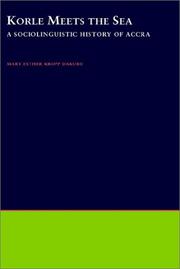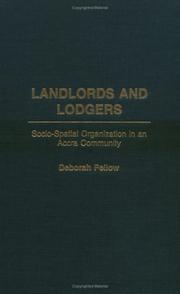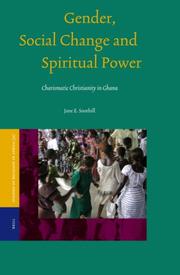| Listing 1 - 7 of 7 |
Sort by
|

ISBN: 1280524219 0195345185 9780195345186 9781280524219 019506061X 0197721834 Year: 1997 Publisher: New York : Oxford University Press,
Abstract | Keywords | Export | Availability | Bookmark
 Loading...
Loading...Choose an application
- Reference Manager
- EndNote
- RefWorks (Direct export to RefWorks)
For centuries, Accra, the capital of Ghana, has been a linguistic anomaly that contains 44 indigenous languages, of which most members of its population speak at least two, Using linguistic, historical, and ethnographic techniques, Dakubu explores the origins and durability of this multilingualism and how it has affected Ghanaian society.
Multilingualism --- Plurilingualism --- Polyglottism --- Language and languages --- Accra (Ghana) --- Akkra (Ghana) --- Akra (Ghana) --- Nkran (Ghana) --- أكرا (Ghana) --- Горад Акра (Ghana) --- Horad Akra (Ghana) --- Акра (Ghana) --- Аккра (Ghana) --- Ακκρα (Ghana) --- Acra (Ghana) --- Akrao (Ghana) --- 아크라 (Ghana) --- Ak'ŭra (Ghana) --- Аккрæ (Ghana) --- Akkræ (Ghana) --- אקרה (Ghana) --- Aḳrah (Ghana) --- アクラ (Ghana) --- Languages.
Book
ISBN: 0815650973 9780815650973 9780815631729 0815631723 Year: 2009 Publisher: Syracuse, N.Y.
Abstract | Keywords | Export | Availability | Bookmark
 Loading...
Loading...Choose an application
- Reference Manager
- EndNote
- RefWorks (Direct export to RefWorks)
Globalization --- Urbanization --- Global cities --- Globalisation --- Internationalization --- International relations --- Anti-globalization movement --- Cities and towns, Movement to --- Urban development --- Urban systems --- Cities and towns --- Social history --- Sociology, Rural --- Sociology, Urban --- Urban policy --- Rural-urban migration --- Accra (Ghana) --- Akkra (Ghana) --- Akra (Ghana) --- Nkran (Ghana) --- أكرا (Ghana) --- Горад Акра (Ghana) --- Horad Akra (Ghana) --- Акра (Ghana) --- Аккра (Ghana) --- Ακκρα (Ghana) --- Acra (Ghana) --- Akrao (Ghana) --- 아크라 (Ghana) --- Ak'ŭra (Ghana) --- Аккрæ (Ghana) --- Akkræ (Ghana) --- אקרה (Ghana) --- Aḳrah (Ghana) --- アクラ (Ghana) --- Economic conditions. --- Economic conditions --- Urbanization - Ghana - Accra --- Globalization - Ghana - Accra --- Accra (Ghana) - Economic conditions

ISBN: 9780226653976 0226653978 0313012393 9780313012396 0275976009 9780275976002 1280422882 9781280422881 9786610422883 6610422885 9798400676444 Year: 2002 Publisher: Westport, Conn. : London : Praeger, Bloomsbury Publishing,
Abstract | Keywords | Export | Availability | Bookmark
 Loading...
Loading...Choose an application
- Reference Manager
- EndNote
- RefWorks (Direct export to RefWorks)
Human territoriality --- Spatial behavior --- Hausa (African people) --- Muslims --- Territorialité humaine --- Comportement spatial --- Haoussa (Peuple d'Afrique) --- Musulmans --- History --- Social conditions --- Histoire --- Conditions sociales --- Accra (Ghana) --- Social conditions. --- Mohammedans --- Moors (People) --- Moslems --- Muhammadans --- Musalmans --- Mussalmans --- Mussulmans --- Mussulmen --- Religious adherents --- Islam --- Abakwariga (African people) --- Afuno (African people) --- Haoussa (African people) --- Hausaawaa (African people) --- Hausas --- Hausawa (African people) --- Haussa (African people) --- Hawsa (African people) --- Mgbakpa (African people) --- Ethnology --- Behavior, Spatial --- Proxemic behavior --- Space behavior --- Spatially-oriented behavior --- Psychology --- Space and time --- Territorial behavior --- Territoriality, Human --- Human geography --- History. --- #SBIB:39A73 --- #SBIB:39A11 --- Etnografie: Afrika --- Antropologie : socio-politieke structuren en relaties --- Territorialité humaine --- Accra (Ghāna) --- Akkra (Ghana) --- Akra (Ghana) --- Nkran (Ghana) --- أكرا (Ghana) --- Горад Акра (Ghana) --- Horad Akra (Ghana) --- Акра (Ghana) --- Аккра (Ghana) --- Ακκρα (Ghana) --- Acra (Ghana) --- Akrao (Ghana) --- 아크라 (Ghana) --- Ak'ŭra (Ghana) --- Аккрæ (Ghana) --- Akkræ (Ghana) --- אקרה (Ghana) --- Aḳrah (Ghana) --- アクラ (Ghana)

ISBN: 1281926175 9786611926175 9047419391 9789047419396 9789004157897 9004157891 9781281926173 6611926178 Year: 2007 Volume: 30 Publisher: Leiden Boston Brill
Abstract | Keywords | Export | Availability | Bookmark
 Loading...
Loading...Choose an application
- Reference Manager
- EndNote
- RefWorks (Direct export to RefWorks)
Charismatic Christianity is the most recent and fastest growing expression of Pentecostal religion in Sub-Saharan Africa. In Ghana's capital, Accra, the charismatic churches dominate the religious scene. This book focuses on the gender discourses of Ghana's new churches, and considers charismatic perspectives on womanhood, manhood, marriage and family life. Offering a fresh perspective on the organisational structures of the charismatic churches, this study looks at the leadership roles of female pastors and pastors' wives, and draws attention to the links between female leaders and spiritual power. By highlighting the importance of spiritual power in interpreting gendered social change, the book sheds new light on the socio-cultural role of Ghana's new churches.
Geschlechterrolle. --- Pfingstbewegung. --- Sozialer Wandel. --- Pentecostal churches --- Pentecostalism --- Sociological aspects. --- Accra. --- Ghana. --- Accra (Ghana) --- Akkra (Ghana) --- Akra (Ghana) --- Nkran (Ghana) --- أكرا (Ghana) --- Горад Акра (Ghana) --- Horad Akra (Ghana) --- Акра (Ghana) --- Аккра (Ghana) --- Ακκρα (Ghana) --- Acra (Ghana) --- Akrao (Ghana) --- 아크라 (Ghana) --- Ak'ŭra (Ghana) --- Аккрæ (Ghana) --- Akkræ (Ghana) --- אקרה (Ghana) --- Aḳrah (Ghana) --- アクラ (Ghana) --- Church history. --- Pentecostal women --- Sex role --- Gender role --- Sex (Psychology) --- Sex differences (Psychology) --- Social role --- Gender expression --- Sexism --- Women, Pentecostal --- Christian women --- Sociological aspects --- Social conditions --- Religious aspects&delete& --- Social conditions. --- Religious aspects --- Pentecostal churches. --- Eglises pentecôtistes --- Femmes pentecôtistes --- Rôle selon le sexe --- Aspect sociologique --- Conditions sociales --- Aspect religieux --- Histoire religieuse --- Gender roles --- Gendered role --- Gendered roles --- Role, Gender --- Role, Gendered --- Role, Sex --- Roles, Gender --- Roles, Gendered --- Roles, Sex --- Sex roles --- gender issues --- charismatic christianity --- pentecostal religion --- Africa --- womanhood --- manhood --- marriage --- family life
Book
ISBN: 0190934549 0190934581 0190934573 9780190934545 9780190934552 0190934557 Year: 2022 Publisher: New York, NY Oxford University Press
Abstract | Keywords | Export | Availability | Bookmark
 Loading...
Loading...Choose an application
- Reference Manager
- EndNote
- RefWorks (Direct export to RefWorks)
"This book explores the complex cultural, economic, and environmental health politics of electronic waste (e-waste) in Ghana. Global trade in e-waste has led to various global e-waste management challenges and many regions of the Global South, like Ghana, have suffered the consequences. Based on ethnographic research, the book exposes the lived experience of Ghana's e-waste workers, as they navigate the health, social, and economic challenges of e-waste labor, especially e-waste workers burning electrical wires to extract copper, a valuable and ubiquitous tech metal. With a particular focus on e-waste workers working in an urban scrap metal market known as Agbogbloshie, the book examines the ways in which this labor practice has raised concerns about toxic exposures and urban environmental contamination and has drawn the attention of international organizations seeking to find "green" solutions to severe environmental and health risks posed by these e-waste burning. Addressing the practices and risks of e-waste burning and the politics and optimism of environmental health interventions, the book explores the theoretical import of the "pyropolitical ecology of e-waste," an approach developed to augment and synthesize the emerging anthropology and political ecology of e-waste ruination, environmental justice, and uncertainty in the Global South"--
Scrap metal industry --- Employees --- Health and hygiene --- Recycling industry --- Electronic waste --- Political ecology --- Environmental economics --- Economics --- Environmental quality --- Social ecology --- Green movement --- E-scrap --- E-waste --- Waste electrical and electronic equipment --- Waste electronic apparatus and appliances --- Waste electronic appliances --- WEEE (Waste electrical and electronic equipment) --- Electronic apparatus and appliances --- Refuse and refuse disposal --- Environmental aspects --- Government policy --- Economic aspects --- Accra (Ghana) --- Akkra (Ghana) --- Akra (Ghana) --- Nkran (Ghana) --- أكرا (Ghana) --- Горад Акра (Ghana) --- Horad Akra (Ghana) --- Акра (Ghana) --- Аккра (Ghana) --- Ακκρα (Ghana) --- Acra (Ghana) --- Akrao (Ghana) --- 아크라 (Ghana) --- Ak'ŭra (Ghana) --- Аккрæ (Ghana) --- Akkræ (Ghana) --- אקרה (Ghana) --- Aḳrah (Ghana) --- アクラ (Ghana) --- Environmental conditions. --- Social conditions. --- #SBIB:39A4 --- #SBIB:39A73 --- #SBIB:316.334.2A87 --- Toegepaste antropologie --- Etnografie: Afrika --- Bijzondere arbeidsproblemen: industrie en ecologie, duurzaam ondernemen
Book
ISBN: 1580468578 1580464947 1322078890 Year: 2014 Publisher: Suffolk : Boydell & Brewer,
Abstract | Keywords | Export | Availability | Bookmark
 Loading...
Loading...Choose an application
- Reference Manager
- EndNote
- RefWorks (Direct export to RefWorks)
Established as the commercial and administrative capital of the Gold Coast Colony (now Ghana) in the late nineteenth century, the city of Accra experienced profound societal changes throughout the twentieth century. The Politics of Chieftaincy examines the disputes over authority and property during the peak decades of British colonial rule. Between 1920 and 1950, colonization, commercialization, and urbanization sparked and sharpened a range of controversies. The removal of chiefs from office, succession disputes, and litigation resulting from land alienation and urban development became commonplace. An intriguing dynamic unfolded as colonial rule intersected with grassroots politics: although chieftaincy disputes and litigation were powerful sites of conflict and disruption, they also became spaces for local people to negotiate the sociopolitical and economic changes of the period. Sackeyfio-Lenoch demonstrates how these disputes opened new arenas for Accra's residents to engage in dialogue about the efficacy of chieftaincy and the meaning of property and its alienation during colonial rule. Accra exerted dominance inthe region by virtue of its location and status; its history provides us with an important case study for understanding urban and colonial processes in Africa during the first half of the twentieth century. Naaborko Sackeyfio-Lenoch is Assistant Professor of African History at Dartmouth College.
Politics and government. --- Land tenure. --- Gã (African people) --- Chiefdoms. --- HISTORY --- Land tenure --- Chiefdoms --- Annals --- Auxiliary sciences of history --- Chieftaincies --- Chieftainships --- Political anthropology --- Ethnology --- Agrarian tenure --- Feudal tenure --- Freehold --- Land ownership --- Land question --- Landownership --- Tenure of land --- Land use, Rural --- Real property --- Land, Nationalization of --- Landowners --- Serfdom --- West. --- History. --- Ghana --- Ghana. --- Accra (Ghana) --- Akkra (Ghana) --- Akra (Ghana) --- Nkran (Ghana) --- أكرا (Ghana) --- Горад Акра (Ghana) --- Horad Akra (Ghana) --- Акра (Ghana) --- Аккра (Ghana) --- Ακκρα (Ghana) --- Acra (Ghana) --- Akrao (Ghana) --- 아크라 (Ghana) --- Ak'ŭra (Ghana) --- Аккрæ (Ghana) --- Akkræ (Ghana) --- אקרה (Ghana) --- Aḳrah (Ghana) --- アクラ (Ghana) --- Chia-na --- Dēmokratia tēs Gkanas --- Gáana --- Gana --- Gana ka Fasojamana --- Gana Konghwaguk --- Gana Respublikaḣy --- Ganæ --- Ganah --- Ganao --- Ganmudin Orn --- Ghana Vabariik --- Ghanako Errepublika --- Ghaney --- Ghanská republika --- Gkana --- Government of Ghana --- Gweriniaeth Ghana --- Hana (Ghana) --- IGana --- Ochíchìíwú Ghana --- Pobblaght ny Ganey --- Poblachd Ghàna --- Poblacht Ghána --- Qana --- Qana Respublikası --- Repubblica del Ghana --- Republic of Ghana --- República de Ghana --- Rèpublica du Gana --- Republik Ghana --- Republika Gana --- Republiḳat Ganah --- République du Ghana --- Rėspublika Hana --- Respublikæ Ganæ --- Tjóðveldið Gana --- Yn Ghaney --- Γκάνα --- Δημοκρατία της Γκάνας --- Рэспубліка Гана --- Республикæ Ганæ --- Република Гана --- Ганæ --- Гана --- Ганмудин Орн --- רפובליקת גאנה --- גאנה --- ガーナ --- 가나 --- 가나 공화국 --- Ashanti --- Gold Coast --- Northern Territories of the Gold Coast --- Togoland (British) --- History --- Accra. --- British colonial rule. --- Ga chiefs. --- Gold Coast colony. --- authority. --- independent state. --- land tenure reform. --- local elites. --- local resistance. --- political movements. --- political power. --- property. --- reconstruction.
Book
ISBN: 9400767315 9400767323 9400796471 Year: 2013 Publisher: Dordrecht, Netherlands : Springer,
Abstract | Keywords | Export | Availability | Bookmark
 Loading...
Loading...Choose an application
- Reference Manager
- EndNote
- RefWorks (Direct export to RefWorks)
This book provides a fresh analysis of the demography, health and well-being of a major African city. It brings a range of disciplinary approaches to bear on the pressing topics of urban poverty, urban health inequalities and urban growth. The approach is primarily spatial and includes the integration of environmental information from satellites and other geospatial sources with social science and health survey data. The authors Ghanaians and outsiders, have worked to understand the urban dynamics in this burgeoning West African metropolis, with an emphasis on urban disparities in health and living standards. Few cities in the global South have been examined from so many different perspectives. Our analysis employs a wide range of GIScience methods, including analysis of remotely sensed imagery and spatial statistical analysis, applied to a wide range of data, including census, survey and health clinic data, all of which are supplemented by field work, including systematic social observation, focus groups, and key informant interviews. This book aims to explain and highlight the mix of methods, and the important findings that have been emerging from this research, with the goal of providing guidance and inspiration for others doing similar work in cities of other developing nations.
Regional economic disparities. --- Regional economics -- Congresses. --- Regional planning -- Congresses. --- Anthropology --- Social Sciences --- Anthropogeography & Human Ecology --- Social sciences. --- Remote sensing. --- Public health. --- Ghana --- Accra (Ghana) --- Economic conditions --- Regional disparities. --- Economic conditions. --- Social conditions. --- Community health --- Health services --- Hygiene, Public --- Hygiene, Social --- Public health services --- Public hygiene --- Sanitary affairs --- Social hygiene --- Remote-sensing imagery --- Remote sensing systems --- Remote terrain sensing --- Sensing, Remote --- Terrain sensing, Remote --- Behavioral sciences --- Human sciences --- Sciences, Social --- Social science --- Social studies --- Akkra (Ghana) --- Akra (Ghana) --- Nkran (Ghana) --- أكرا (Ghana) --- Горад Акра (Ghana) --- Horad Akra (Ghana) --- Акра (Ghana) --- Аккра (Ghana) --- Ακκρα (Ghana) --- Acra (Ghana) --- Akrao (Ghana) --- 아크라 (Ghana) --- Ak'ŭra (Ghana) --- Аккрæ (Ghana) --- Akkræ (Ghana) --- אקרה (Ghana) --- Aḳrah (Ghana) --- アクラ (Ghana) --- Chia-na --- Gana --- Republic of Ghana --- Ganah --- Government of Ghana --- Rèpublica du Gana --- Qana --- Qana Respublikası --- Gana ka Fasojamana --- Republik Ghana --- Гана --- Gana Respublikaḣy --- Hana (Ghana) --- Рэспубліка Гана --- Rėspublika Hana --- Република Гана --- Republika Gana --- Ghanská republika --- Gweriniaeth Ghana --- Gáana --- Ghana Vabariik --- Γκάνα --- Gkana --- Δημοκρατία της Γκάνας --- Dēmokratia tēs Gkanas --- República de Ghana --- Ganao --- Ghanako Errepublika --- Tjóðveldið Gana --- République du Ghana --- Poblacht Ghána --- Yn Ghaney --- Ghaney --- Pobblaght ny Ganey --- Poblachd Ghàna --- Ганмудин Орн --- Ganmudin Orn --- 가나 --- 가나 공화국 --- Gana Konghwaguk --- Ochíchìíwú Ghana --- Ганæ --- Ganæ --- Республикæ Ганæ --- Respublikæ Ganæ --- IGana --- Repubblica del Ghana --- גאנה --- רפובליקת גאנה --- Republiḳat Ganah --- ガーナ --- Urban ecology (Biology). --- Demography. --- Human geography. --- Social Sciences. --- Human Geography. --- Public Health. --- Remote Sensing/Photogrammetry. --- Urban Ecology. --- Health --- Human services --- Biosecurity --- Health literacy --- Medicine, Preventive --- National health services --- Sanitation --- Aerial photogrammetry --- Aerospace telemetry --- Detectors --- Space optics --- Civilization --- Anthropo-geography --- Anthropogeography --- Geographical distribution of humans --- Social geography --- Geography --- Human ecology --- Historical demography --- Social sciences --- Population --- Vital statistics --- Cities and towns --- City ecology (Biology) --- Ecology --- Environmental aspects --- Togoland (British) --- Gold Coast --- Ashanti --- Northern Territories of the Gold Coast --- Urban ecology --- Urban environment --- Social ecology --- Sociology, Urban --- Accra (Ghana) $x Social conditions.
| Listing 1 - 7 of 7 |
Sort by
|

 Search
Search Feedback
Feedback About UniCat
About UniCat  Help
Help News
News